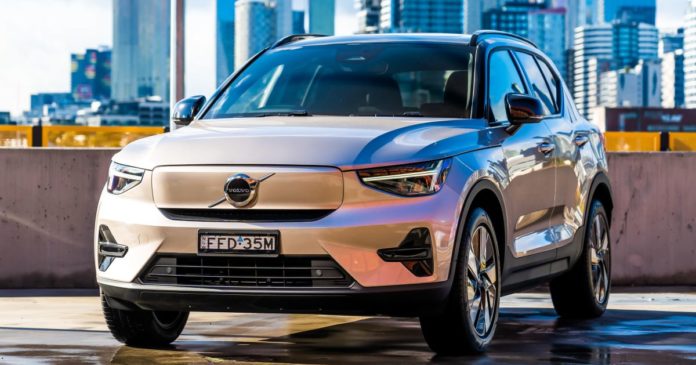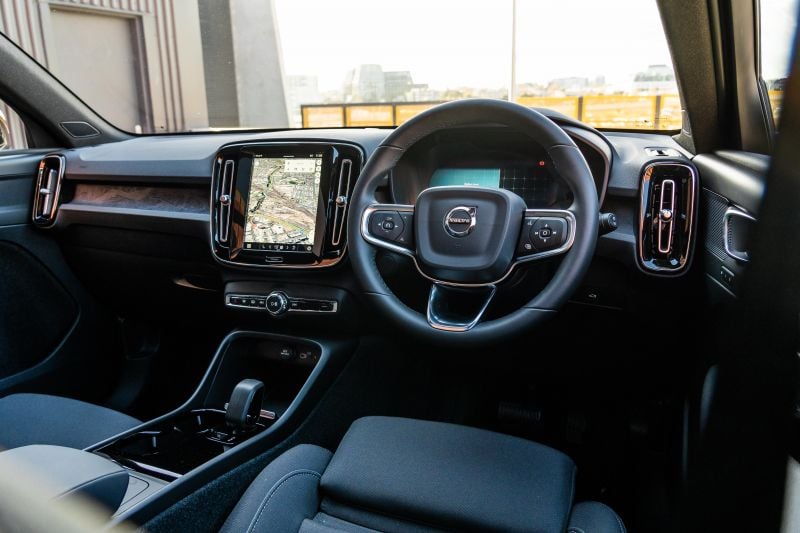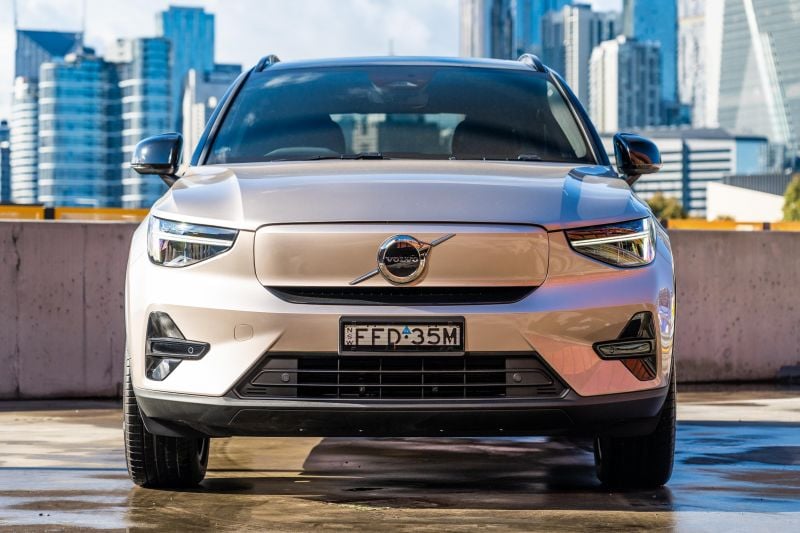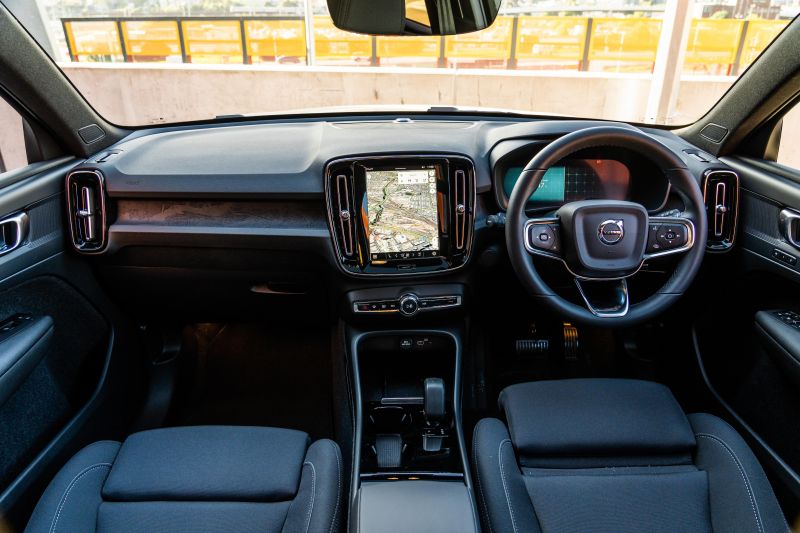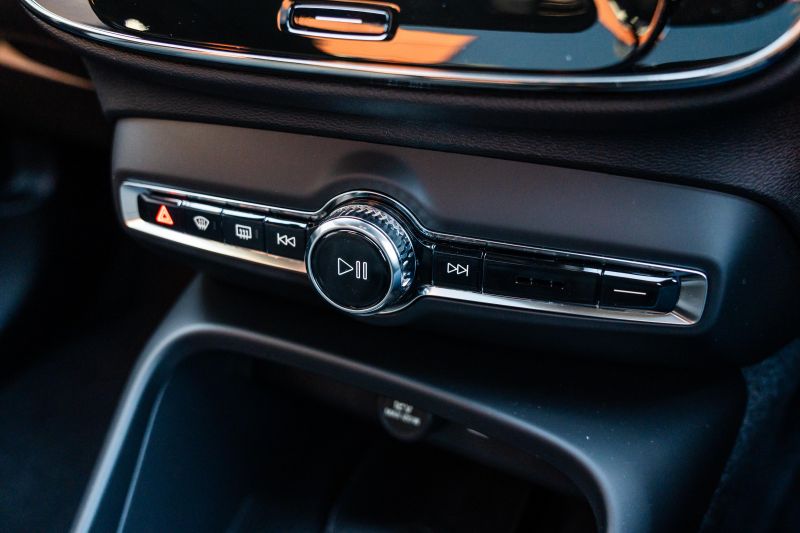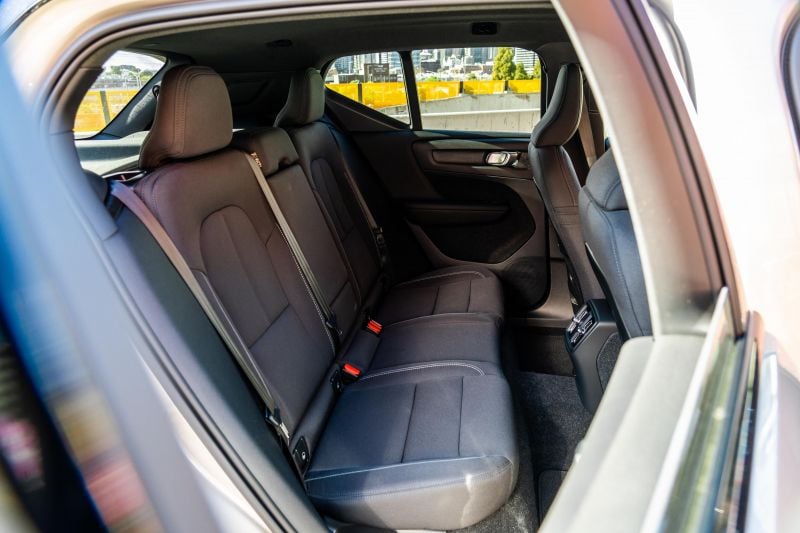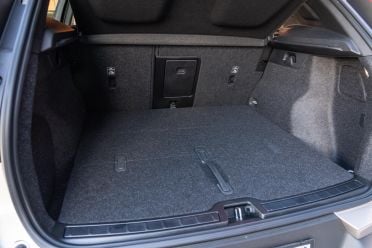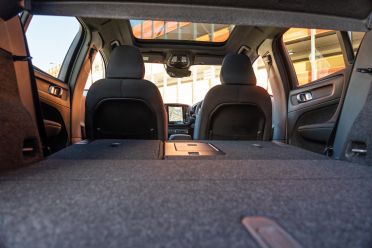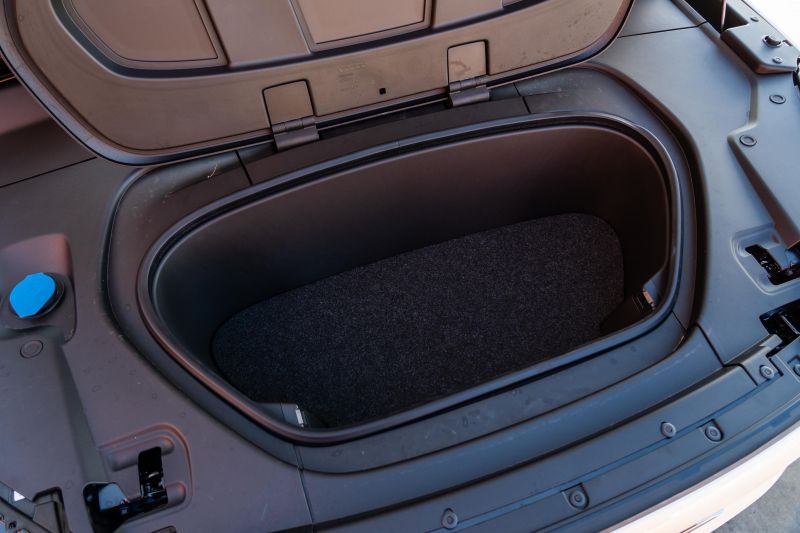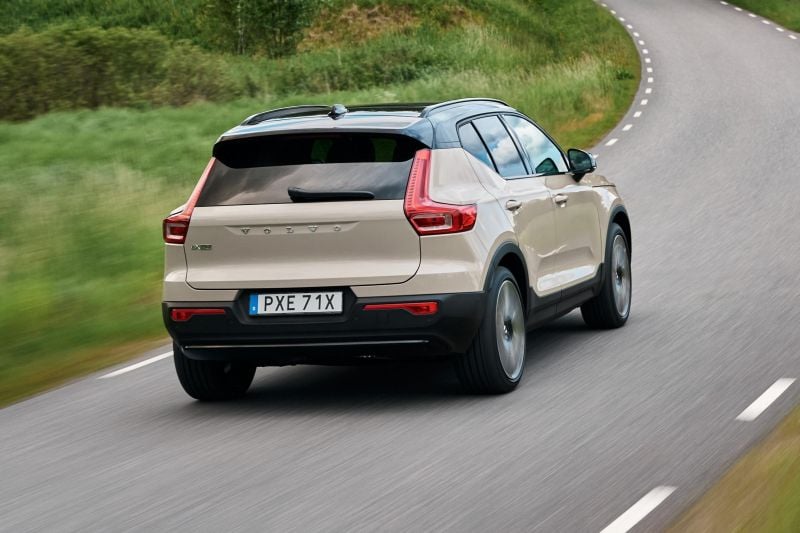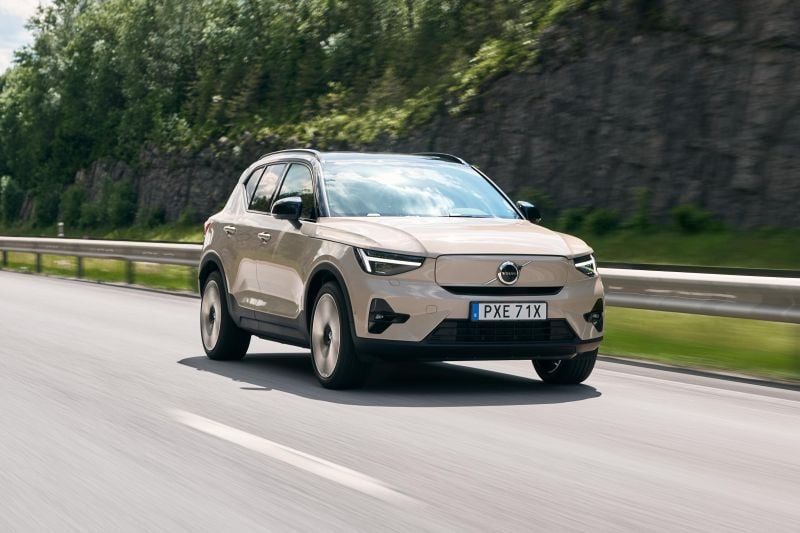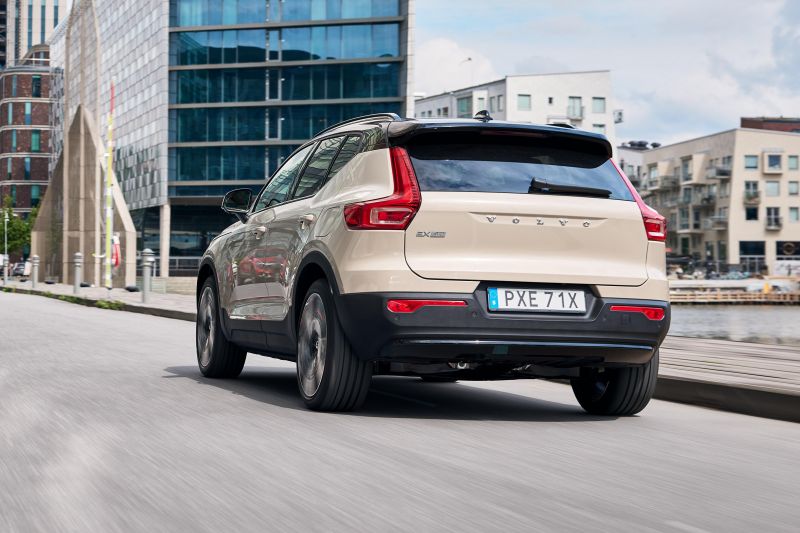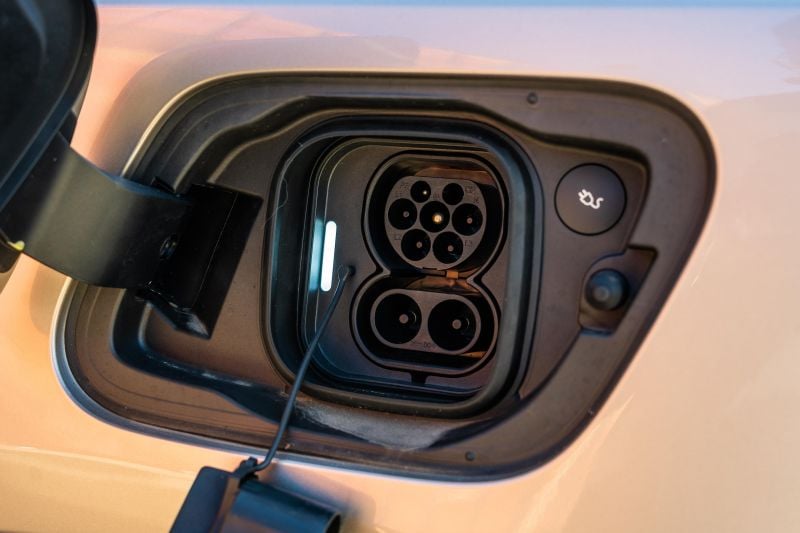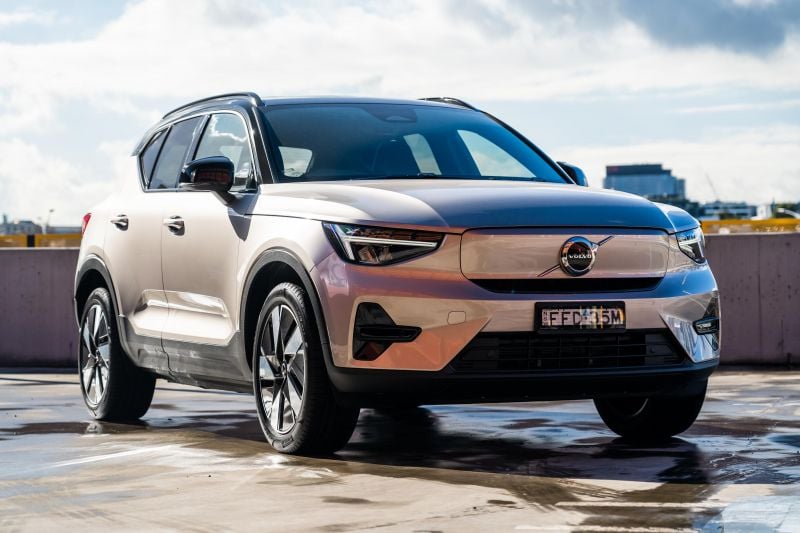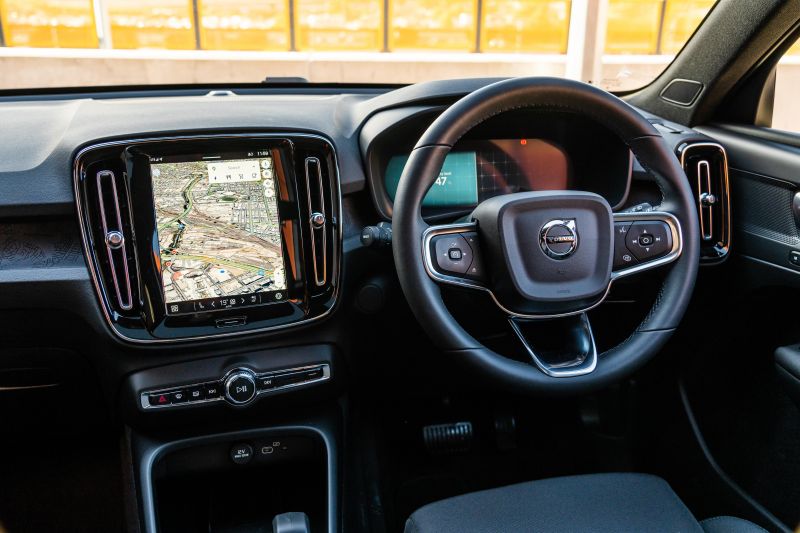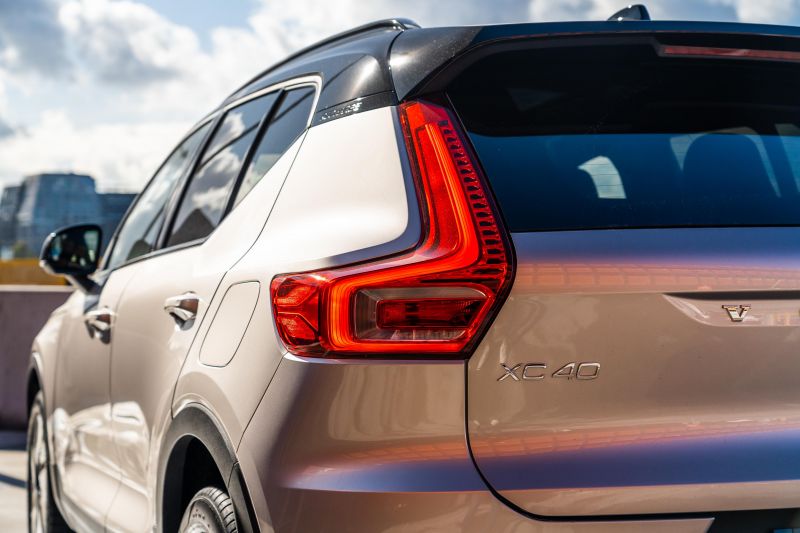The Volvo XC40 Recharge Pure Electric is about to get a name change.
While there’s no major changes to its styling or drivetrains, the compact electric SUV will be rebadged EX40 for 2025 to better align with Volvo’s EV naming strategy.
That means the EX40 will join the existing EX30 and EX90, with more to come. The related C40 Recharge coupe crossover will likewise be rebadged EC40.
But the 2024 Volvo XC40 Recharge Pure Electric you see here will be largely unchanged for the updated range. So, what are we working with?
Following a pretty comprehensive update under the skin late last year, the base XC40 Recharge went from front-wheel drive to rear-wheel drive – yes, this little SUV is rear-wheel drive. It also gained a new battery for improved range, and the new motor on the rear axle offers improved performance.
It’s otherwise the familiar XC40 formula that first debuted in 2017, apart from a mild refresh and a new Google-powered infotainment system from 2023.
Does the venerable Volvo still have plenty to offer? Or, is it outshone by the newer (but smaller) EX30 sub-compact SUV?
How does the Volvo XC40 compare?
View a detailed breakdown of the Volvo XC40 against similarly sized vehicles.

Volvo
XC40
How much does the Volvo XC40 cost?
The XC40 Recharge range starts with the Plus Single on test, priced from $76,990 before on-road costs.
| Model | Price before on-road costs |
|---|---|
| 2024 Volvo XC40 Plus B4 | $54,990 |
| 2024 Volvo XC40 Ultimate B4 Bright | $61,990 |
| 2024 Volvo XC40 Ultimate B4 Dark | $62,990 |
| 2024 Volvo XC40 Recharge Pure Electric | $76,990 |
| 2024 Volvo XC40 Recharge Twin Pure Electric | $85,990 |
To see how the XC40 Recharge lines up against the competition, check out our comparison tool.
What is the Volvo XC40 like on the inside?
The basic XC40 formula has barely changed in seven years, and that’s no bad thing given how popular this vehicle has been not just in Australia but around the world.
As is typical of the Swedish brand – though the car is sourced from China – there’s an impressive openness and airiness to the cabin, which is a hallmark of Volvo’s wagons and SUVs.
It’s upright, it’s spacious, and ergonomically very good. There’s a general feeling of quality about the execution and ambience, though poking and prodding around shows where some of the costs have been cut.
The chunky Volvo steering wheel is lovely to hold, with a smooth leather rim and simple multifunction switchgear which operates with a solid action. It’s all quite satisfying to use.
It’s a similar story for the row of buttons beneath the touchscreen, as well as the window switches in the doors. There’s a solidity that is typical Volvo.
As you’d expect the front seats are couch levels of comfortable. While they’re textile trimmed in this base model they’re wonderfully supportive and offer heaps of electric adjustment, including memory. The front pews also offer one of my favourite features, in the form of extendable base cushions.
Ahead of the driver is a digital instrument cluster which, as we’ve noted in previous reviews, looks smart but is limited in functionality and adjustability. There’s basically one layout with the option to show Google Maps in the centre or not. It covers the basics, but little else.
The 9.0-inch portrait-oriented centre touchscreen is more impressive despite its smaller quoted dimension, powered by Google built-in. While it retains a similar look to the older Sensus system, it’s faster, more connected, and offers better functionality.
Being Google-based, it has the Google Assistant built-in, integrated Google Maps and various other net-based services out of the box. It almost removes the need to have Apple CarPlay connected it’s actually that good.
You can plug your phone in for Apple CarPlay via USB-C, and it worked seamlessly in our experience. Oddly, there’s still no Android Auto functionality. You do, however, get remote functions via the Volvo app for four years.
Another thing to note is the absence of physical climate controls, with permanent virtual shortcuts sitting at the base of the touchscreen. It can be fiddly when you first try it, but it’s better than some of the other virtual buttons we’ve sampled.
It’s also frustrating the heated seat and steering wheel controls are buried in the touchscreen, particularly for the latter. Surely, the button for the heated steering wheel should be… on the steering wheel?
Thankfully, Volvo has kept the demister functions as hard buttons below the touchscreen, in addition to a volume knob that doubles up as a play/pause button, flanked by skip buttons on either side.
Another reason for the XC40’s enduring popularity is the practicality of the rear cabin. The Pure Electric version retains these positive traits from the ICE donor car.
The tall, boxy body means there’s better space for taller passengers than in most competitors. I’m 6’1 and can comfortably sit behind my preferred driving position with room to spare. Kids will be very happy back here, and shouldn’t be prone to travel sickness thanks to the plentiful glasshouse.
You get directional air vents in the rear, and there’s amenities like big door bins, map pockets, and a fold-down centre armrest with cupholders. The ICE platform has carried over the rear driveline hump from petrol-fired AWD versions of the XC40, but it’s otherwise very good for the class.
Parents with smaller kids will be catered for with ISOFIX anchor points on the outboard rear seat positions, as well as top tether points across the backs of all three rear seats. The wide and flat rear bench means you have plenty of options when you need to cart multiple people around.
While practicality is an XC40 strong suit, its 410-litre cargo volume claim isn’t quite class-leading. However, the tall and square body makes it a very usable space, and the rear seats fold flat to open up a quoted 1295 litres.
There’s also a variable floor if you need to create smaller compartments to stop your things rolling around or falling over, and there’s some good underfloor storage.
| Dimensions | Volvo XC40 Recharge |
|---|---|
| Length | 4440mm |
| Width | 1938mm |
| Height | 1651mm |
| Wheelbase | 2702mm |
| Boot capacity | 410L-1295L |
To see how the XC40 Recharge lines up against the competition, check out our comparison tool.
What’s under the bonnet?
There’s no petrol engine under the bonnet, rather a small 31-litre storage area for stowing your cables, or whatever else you feel like squeezing in there.
| Specifications | Volvo XC40 Recharge Single |
|---|---|
| Drivetrain | Single-motor electric |
| Battery | 69kWh li-ion |
| Power | 175kW |
| Torque | 420Nm |
| Driven wheels | Rear |
| Weight | 2040kg |
| 0-100km/h (claimed) | 7.3 seconds |
| Claimed range | 435 kilometres |
| Max AC charge rate | 11kW |
| Max DC charge rate | 130kW |
To see how the XC40 Recharge lines up against the competition, check out our comparison tool.
How does the Volvo XC40 drive?
A lot of people gravitate to the pace and response of dual-motor electric vehicles, but I’d argue most single-motor versions are more balanced in their power delivery and are often more efficient.
-
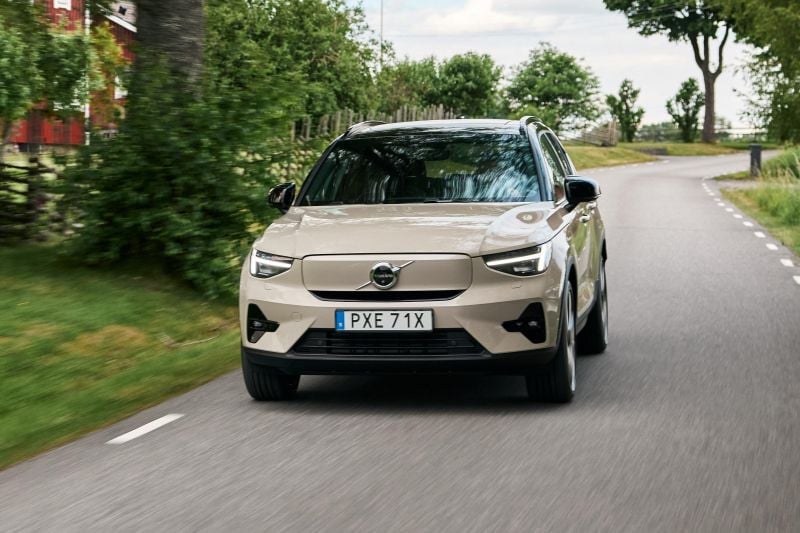
2025 EX40 shown
In the case of the XC40 Recharge (soon to be the EX40), having 175kW and 420Nm on the rear axle is more than enough to get this admittedly heavy 2040kg electric SUV moving at decent pace.
Volvo quotes a 0-100km/h time of 7.3 seconds which is hardly slow. Not long ago that was the sort of pace you’d expect from hot hatches.
The XC40 may not always feel quite that quick in its standard setting, as Volvo (and Polestar) have a habit of making the throttle a little doughy to gradually pile on power for smooth and linear acceleration.
Floor it and you’ll get a move on briskly, but otherwise you can sort of effortlessly waft along in a cruisier manner, which perhaps is better suited to the XC40’s more comfort-focused and family-friendly pitch.
Speaking of comfort, the smaller 19-inch alloy wheels and chubbier 235/50 tyres make the single-motor XC40 Recharge more compliant than the Twin riding on bigger 20-inch alloys.
While the XC40 does without adaptive damping there’s a nice balance between comfort and body control, with a slight lean to the firmer side of things to account for the added weight of the big battery pack in the floor pan.
It occasionally thuds over sharper hits, but is otherwise pretty well sorted and deals with the lumps and bumps of city life reasonably well.
Active damping would be a welcome future addition, to allow for better adjustability in lieu of the air suspension available on larger Volvo models.
There’s a pretty heavy weighting to the steering though it gives a reassuring level of feedback and accuracy to make the XC40 an agreeable urban companion.
It’s easy to thread through traffic and bustling city streets, and isn’t intimidating to park thanks to its good outward visibility, and upright and compact lines. The Plus’s reversing camera is average, and it’s a shame you can’t option the Ultimate Twin’s surround camera system.
There’s a single-pedal driving mode which is one of the more effective systems this side of a Tesla, though you can drive it like a normal XC40 if you wish.
It’s also nicely insulated from the outside world, though there’s a hint of tyre roar at higher speeds on rougher sections of blacktop – this is far from uncommon in the compact premium segments, though.
Volvo’s driver assistance technologies are on the better end of the breed. The Pilot Assist function is selectable via the steering wheel controls, and combines adaptive cruise and lane centring for semi-autonomous driving on the highway and during traffic jams.
It’s one of the more accurate and intuitive systems on the market, and helps to take the load off extended stints behind the wheel or during peak-hour when you’re held up bumper-to-bumper at the end of a freeway.
Standard blind-spot monitoring and rear cross-traffic alert bolster the already good outward visibility, accounting for the big rear pillars that can obstruct over-the-shoulder view. The XC40 will even brake to mitigate a collision when reversing out of tight parking spaces if you can’t see the crossing traffic.
As noted earlier the reversing camera isn’t the best especially when the rest of Volvo’s features are so good. Thankfully there are front and rear parking sensors, the front ones in particular helping with the XC40’s tall and bluff bonnet.
What do you get?
The XC40 Recharge Single has a slightly lower level of specification than the Twin – Volvo dubs the lower grade ‘Plus’ and the higher variant ‘Ultimate’ in line with other nameplates.
XC40 Recharge highlights:
- 19-inch wheels
- 9.0-inch touchscreen infotainment system
- Google built-in operating system
- Google Automotive Services
- Volvo Cars app
- DAB+ digital radio
- 8-speaker sound system
- 12-inch digital instrument display
- Wireless phone charger
- LED headlights and tail lights
- Keyless entry and start
- Dual-zone climate control
- Heated front and rear seats
- Power-folding rear headrests
- Hands-free power tailgate
- Auto-dimming interior, exterior mirrors
Recharge Twin adds:
- 20-inch alloy wheels
- Harman Kardon premium sound system
- Vegan textile interior trim
- Surround-view camera
Is the Volvo XC40 safe?
The Volvo XC40 has a five-star ANCAP safety rating based on testing conducted by Euro NCAP in 2018.
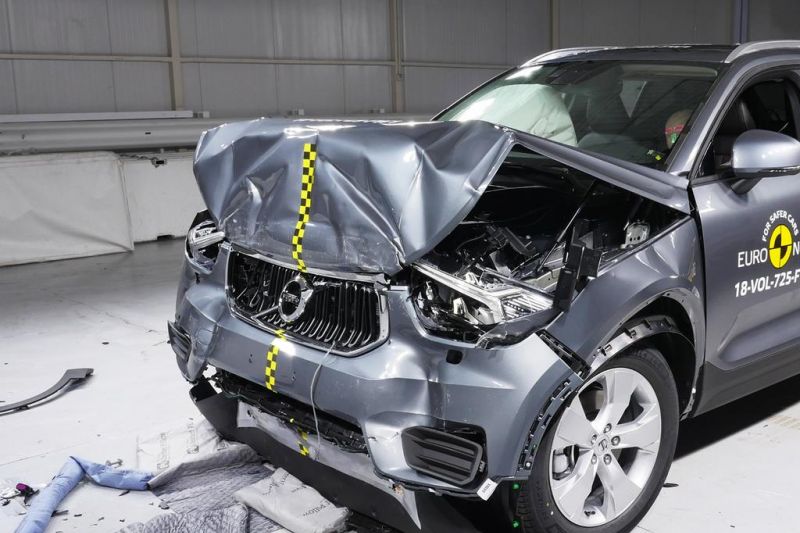
This 2018 Euro NCAP testing was originally conducted on the petrol-powered XC40, but the rating was extended to include the pure-electric and plug-in hybrid Recharge models.
| Category | Volvo XC40 |
|---|---|
| Adult occupant protection | 97 per cent |
| Child occupant protection | 84 per cent |
| Vulnerable road user protection | 71 per cent |
| Safety assist | 78 per cent |
Standard safety features include:
- 7 airbags incl. driver’s knee
- Adaptive cruise control
- Autonomous emergency braking (AEB)
- Vulnerable road user detection
- Lane departure warning
- Lane keep assist
- Blind-spot monitoring
- Parking sensors – front, rear
- Rear cross-traffic alert
- Reversing camera
How much does the Volvo XC40 cost to run?
The XC40 Recharge is backed by the same warranty as the broader Volvo range, but comes with the added perk of free servicing.
| Running costs | Volvo XC40 Recharge Twin |
|---|---|
| Warranty | 5 years, unlimited kilometres |
| Battery warranty | 8 years or 160,000 kilometres |
| Service intervals | 2 years or 30,000km |
| Service pricing | Free (5 years) |
While Volvo doesn’t quote an official power consumption figure in Australia, we saw the XC40 Recharge Single Motor’s trip computer hovering between 17-19kWh/100km during our week of testing.
This is a pretty strong point of difference to the more powerful twin-motor version, which will often balloon into the low- to mid-20kWh/100km in real-world driving – we managed a thirsty 26kWh/100km in a recent review.
CarExpert’s Take on the Volvo XC40
EVs from existing model lines and architecture can sometimes be inherently compromised, but the XC40 Recharge does a great job combining a pure electric drivetrain with an approachable, conventional formula.
This is an XC40 that just happens to be an EV, meaning all the things we know and love about the standard SUV apply. It looks smart, drives well, and is super practical for its size.
In base Single Motor guise, the electric XC40 offers strong value and good levels of performance, and will save you a handy $9000 compared to the more powerful and higher specified XC40 Recharge Twin.
While it lacks a couple of features on the spec sheet, the ‘Plus’-spec XC40 Recharge covers all the bases and then some, and offers premium driving refinement befitting the Volvo badge. Further, it’s priced around the same amount as many German rivals with internal combustion engines.
That’s not to say it’s perfect and you should buy one sight unseen – the reversing camera is poor, and the limited trim options means you basically get to pick your paint and that’s it.
Given its popularity Down Under, it’s a shame Australian customers aren’t offered a little more choice like optional packages, extra upholstery options, or even the bigger battery with the Single Motor drivetrain.
But those shortcomings are far from dealbreakers, and the XC40 Recharge remains very competitive against rivals from German premium marques – the Audi Q4 e-tron, BMW iX1 and Mercedes-Benz EQA all cost substantially more.
It’s definitely worth a look, though it could also be worth waiting for the imminent EX40 rebadge to see if Volvo Australia adjust the lineup and specs to address the aforementioned drawbacks.
Click the images for the full gallery
MORE: Buy a Volvo XC40
MORE: Everything Volvo XC40

